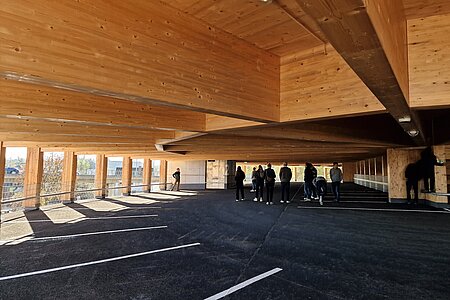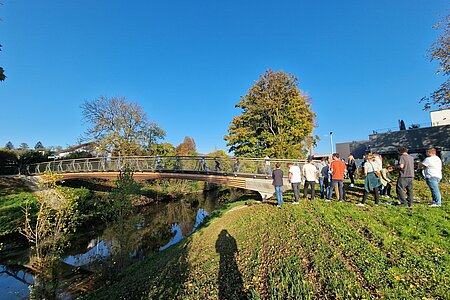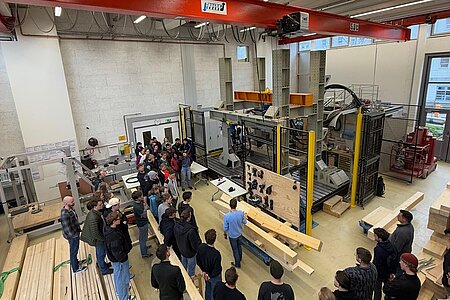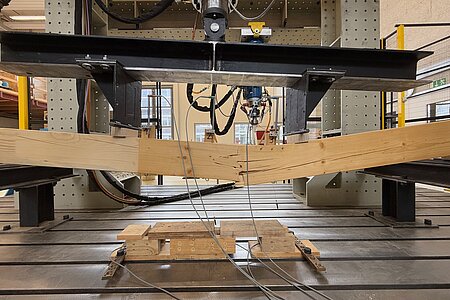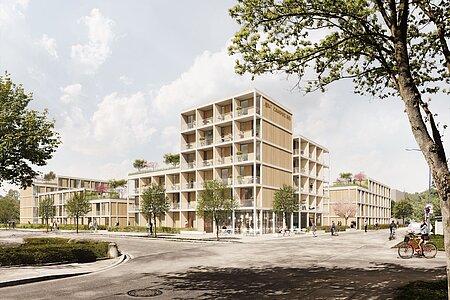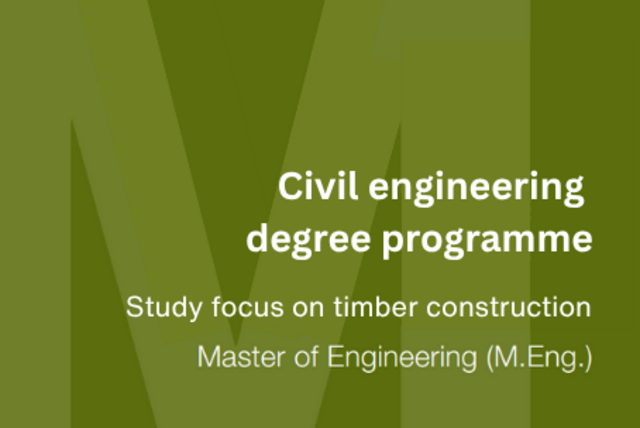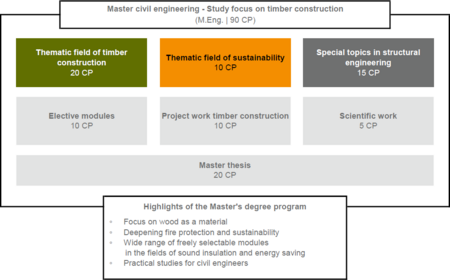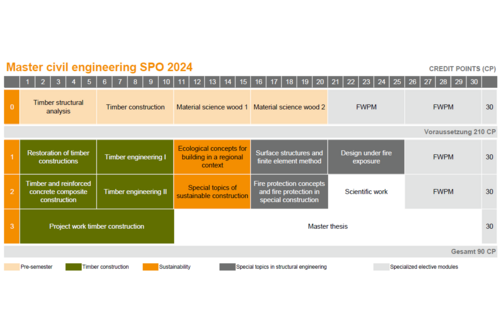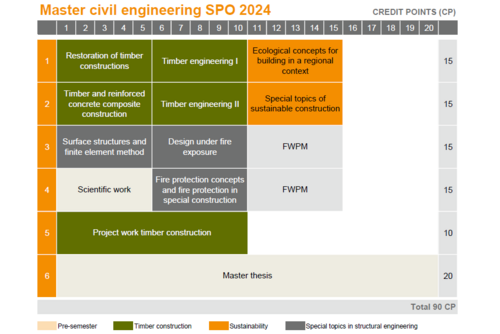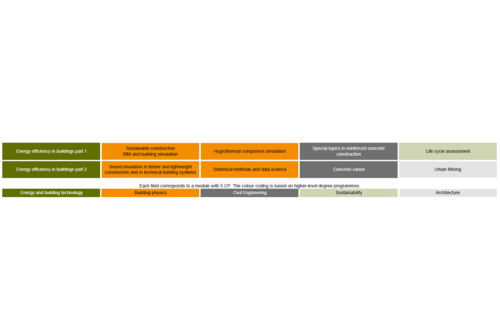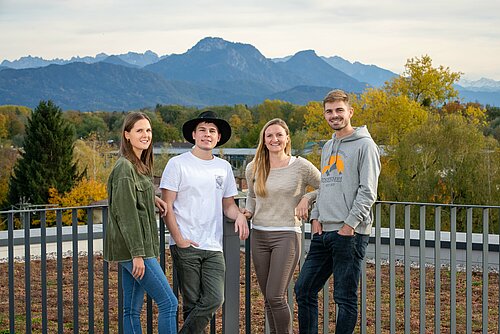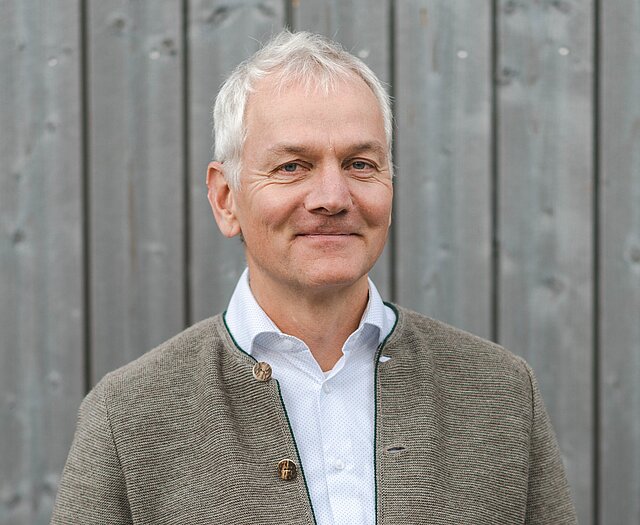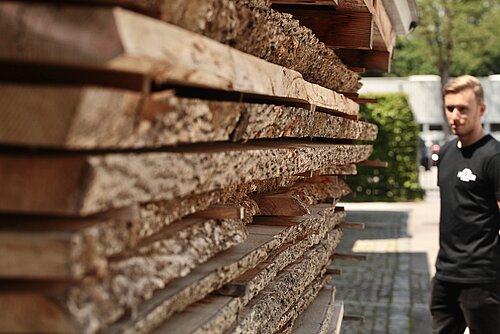About the degree programme
Wood offers great potential as an efficient and ecological building material. The construction industry increasingly needs civil engineers who are specially trained in the use of wood in demanding construction projects and can therefore make an important contribution to sustainable development in the construction industry.
In this course, students acquire in-depth knowledge of wood as a building material and its diverse applications - both in multi-storey timber and timber hybrid construction as well as in existing buildings and in regional areas. Ecological aspects are taken into account as well as requirements for fire protection, building physics, statics and sustainability.
The acquired knowledge is applied and deepened in interdisciplinary project work.
- Full-time or part-time
- Seminar-based teaching: working in small groups
- Network building in the timber industry | Access to the library and numerous e-books | Reduced ticket prices for the International Timber Construction Forum "Internationales Holzbau-Forum (IHF)"
The course not only deepens my specialist knowledge in timber construction, but also in other disciplines beyond the field of timber construction. The interdisciplinary exchange in project work also helps me to think outside the (engineering) box. The small semester size helped me a lot to expand my specialist knowledge in timber construction and other disciplines. I was then able to further consolidate my newly acquired knowledge as part of interdisciplinary project work.

Course content
The Master's degree course in Civil Engineering with a focus on timber construction (M.Eng.) offers the opportunity to deepen and specialise. On the one hand, current knowledge in timber construction as well as competences in sustainable planning and consulting are taught. Furthermore, special topics of structural engineering in the field of fire protection and statics are covered. On the other hand, the range of subject-related compulsory elective subjects allows students to specialise individually and integrally with a focus on energy and building technology, building physics, architecture and ecology.
Students have the opportunity to work in small seminar groups together with architects on current topics and projects, applying and deepening the knowledge they have already acquired. Professors support the student groups with personalised supervision. The project work introduces students to working with various planners in the working world.
The lectures are supported by practical excursions during the semesters. This allows students to apply the knowledge they have learnt on construction sites or in engineering offices.
If you have learnt little about timber construction in your Bachelor's degree or only have 180 CP, we recommend a pre-semester with special knowledge. The lectures include timber construction statics, timber construction design and materials science.
Full-time or part-time study programme
All our students - whether full-time or part-time - attend lectures together. The course content is largely independent of each other, so modules can be completed in two or four semesters. We support you in planning your personal study programme.
Your Master's degree programme can be combined with your professional activity. This is made possible by a customised timetable. Ideally, your employer will support your studies with flexible working hours and, if necessary, a reduction in working hours.
You want to complete a semester abroad or a voluntary internship - this is also possible during your Master's degree programme as part of a semester of leave. Find out about the framework conditions and funding programmes at an early stage.
Career Opportunities
Timber construction and sustainability are in demand
Specialising in timber construction opens up a future-oriented and versatile professional field with excellent prospects for civil engineers. In view of the growing demand for sustainable construction methods, resource-saving materials and climate-friendly building concepts, timber construction is becoming increasingly important both nationally and internationally. This development is further strengthened by political framework conditions, funding programmes and growing environmental awareness in society.
As a civil engineer specialising in timber construction, you will be a sought-after specialist in planning offices, timber construction companies, timber engineering, prefabricated house manufacturers, construction management and product development in the wood processing industry. Jobs in the public sector, with testing or approval authorities and in research also offer attractive career options.
The interdisciplinary nature of modern timber construction is particularly noteworthy: in addition to structural design expertise, knowledge of building physics, fire protection, sound insulation and digitalisation (e.g. BIM) is also required. Those with additional skills in the areas of sustainability certification, climate-neutral construction or CO₂ balancing further increase their attractiveness on the labour market.
With the growing number of multi-storey timber construction projects - including school buildings, administrative buildings and even high-rise buildings - the technical complexity is also increasing. This not only opens up responsible tasks for dedicated civil engineers, but also a wide range of opportunities for professional and personal development, e.g. in a managerial role, as an expert or through an academic career.
- With the skills you have acquired, you can support companies, carpentry or engineering firms in the private sector, authorities or institutes in the various subject areas with your practice-orientated knowledge.
- Fields of activity can be in planning, structural design, building physics, prefabrication, marketing and sales as well as quality management. It is also possible to work in research or teaching.
- As a Rosenheim student, you have access to a worldwide network.
- The Master's programme can serve as the basis for a doctorate
Application and admission
When can you apply for the degree programme?
- 15 April - 15 July for a study start in October (winter semester)
- 1 November - 15 January for a study start in March (summer semester)
If you are applying with a university entrance qualification from abroad (see below), you can apply via uni-assist from 15 February/ 1 September onwards.
How can you apply for the degree programme?
- Apply only via uni-assist if you have obtained your higher education entrance qualification outside Germany
- Apply via the TH Rosenheim online application portal if you have obtained your higher education entrance in Germany
→ Application for a degree programme explained step by step
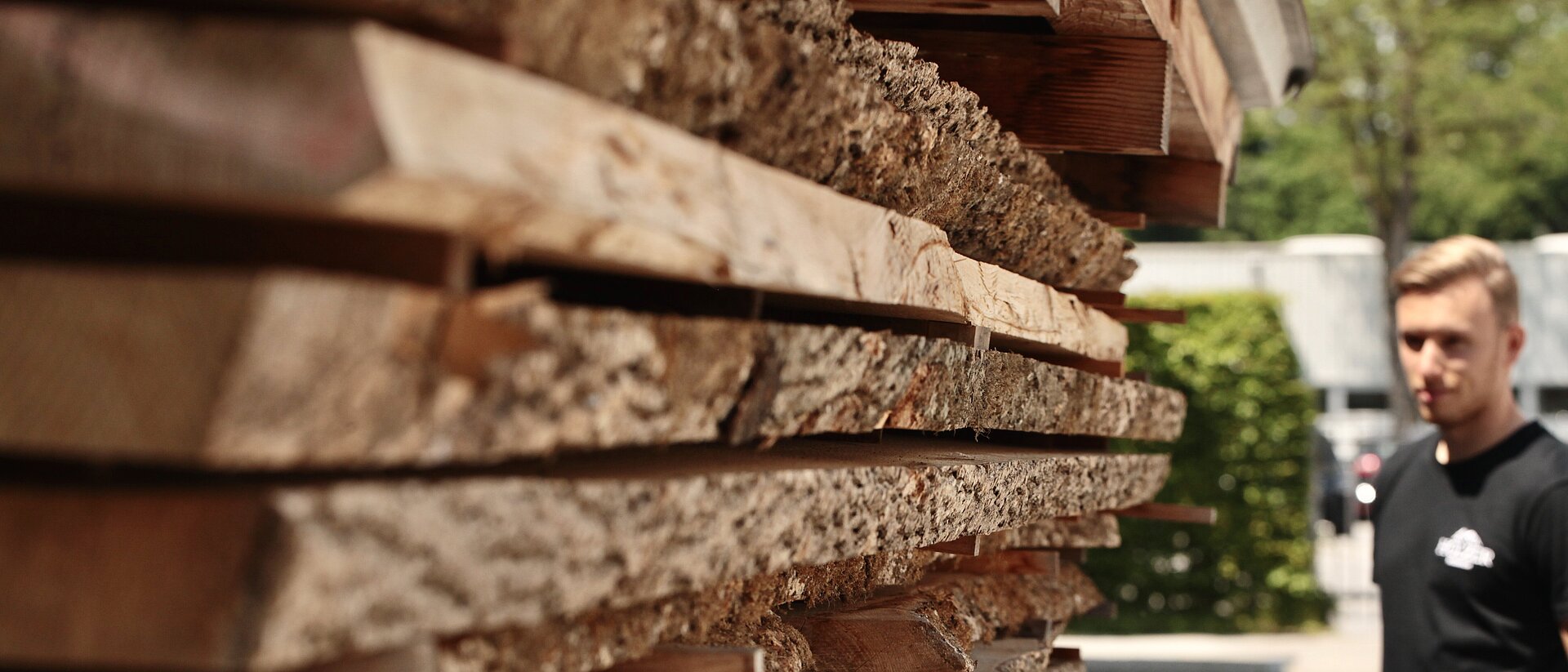
![[Translate to English:] Personen, die über einen Baustellenplan diskutieren](/fileadmin/_processed_/5/7/csm_Hauptbild01-BIM_37309df3b1.jpg)
